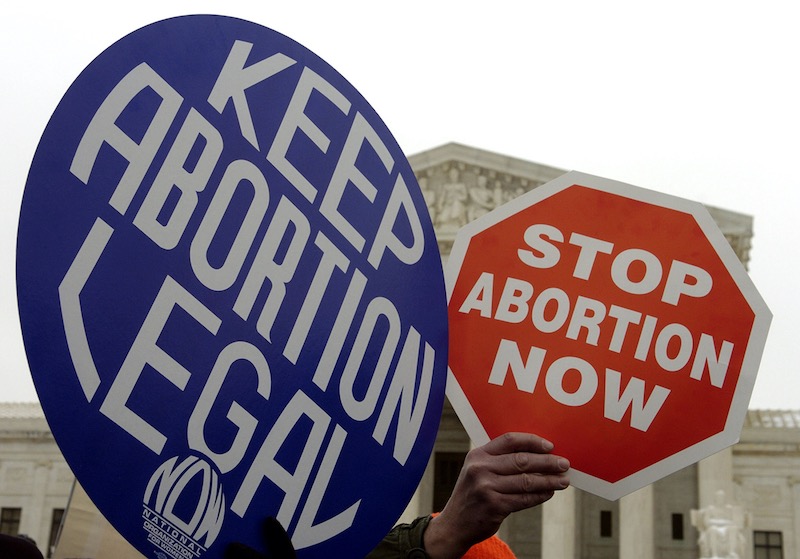Were I a member of the United States Supreme Court or indeed of the US Congress I cannot ever imagine myself voting for the repeal of Roe v Wade. I say that while knowing that as a known Catholic I would likely come under intense pressure, not least from the United States Conference of Bishops, to do everything in my constitutional power to have abortion banned in virtually all circumstances. Fortunately neither being a member of the United States Supreme Court nor indeed of the US Congress is the most likely way I might spend the rest of my days: I am not even an American. I shall never have to face that dilemma.
So I speak merely out of solidarity with those who do. I believe that Catholic judges and legislators are in no way being disobedient to the demands of their faith if they hold that those of a different religious conviction who disagree with those demands are not bound by them. In other words the Catholic teaching that life begins at the moment of conception may not be imposed on those who believe that a foetus does not fully arrive at the status of a human being – however we define it – until later in the pregnancy. I am willing to accept such people are acting in good faith and following their consciences, even if I disagree with them.
But I should also say that the majority in Roe v Wade was one of the flimsiest legal judgements I have ever read, verging on the preposterous. It argued that the 14th Amendment to the United States Constitution, brought in to ensure that Black ex-slaves who'd been freed after the Civil War were granted the full rights of citizenship. Even after defeat, many southern States continued to treat Blacks as inferior, and the 14th Amendment, carried in 1868, was brought in to correct that (though as we now know, it didn't.)
The Amendment states: "No State shall make or enforce any law which shall abridge the privileges or immunities of citizens of the United States.” In 1973 the US Supreme Court ruled that this granted a constitutional "right to privacy" on every US citizen – a stretched interpretation if ever there was one – and then went on to argue that a right to privacy gave a woman a right to terminate her pregnancy if she so chose, but only in the first three months or thereabouts. It is significant that the European Court of Human Rights has repeatedly rejected the argument that the right to privacy, which is explicitly upheld in the European Convention rather than deduced from something else as in the American case, implies a right to abortion.
It seems clear to me that the 1973 decision was new legislation, not judicial interpretation, and ought therefore to have been handled by Congress, not by the Supreme Court. It was a matter of politics not constitutional law. And of course subsequent events have proved this, because it has made the composition of the Supreme Court itself an utterly political matter. For decades, Republican candidates for the presidency have dangled before the more conservative parts of the electorate the prospect of appointing conservative judges to the Supreme Court, with the sole object of creating a majority in favour of repealing Roe v Wade.
This is the basis of Donald Trump's pitch to Catholic voters, as well as to Conservative Evangelicals, as it was in the case of both the Bushes and indeed every other Republican contender for high office. The politicisation of the Supreme Court, and its polarisation into four liberals and four conservatives with the Chief Justice, John Roberts, swinging one way and the other in the middle, has been disastrous for respect for the rule of law in America.
However, actually repealing Roe v Wade has not happened, as that would take away the inducement to vote Republican. It needs to be kept permanently on offer, somewhere ahead. Furthermore, repealing Roe v Wade would not end abortion. It would pass the issue back to State legislatures, where it was before 1973. Liberal States could then pass more liberal abortion laws or even decriminalise it altogether, while conservative States could abolish abortion if they wished, or impose strict conditions. A woman wanting an abortion in such a State would have to travel to a more liberal one, and there is no guarantee that these changes would reduce the total number of abortions.
The teaching that life begins at the moment of conception was only officially defined in the 1996 papal encyclical Evangelium Vitae. Before that, there was some doubt on this point, not least because in its first stage of development a newly fertilised ovum was still capable of splitting into two or more, twinning as it is called, so could not be held to have a single human identity up to that point. Secondly, in those early stages, nothing resembling a brain has developed, and without a brain it is difficult to talk of it as a human being.
Pope John Paul II received numerous requests to clarify the issue, including one from Cardinal Hume, and to put it beyond doubt by the exercise of his papal teaching authority. This he did, sweeping aside the counter arguments and concluding that even if they had force, the fact that the early embryo might or might not be a human being was enough to insist in it being treated as if it certainly was. It was as wrong, therefore, to kill something that might be human as it was to kill something that was undeniably so. I am not alone in wondering whether this is a logically sound argument, rather than a circular one.
Be that as it may, the Vatican II document Dignitatus Humanae asserts the right to religious freedom, which means “that all men are to be immune from coercion on the part of individuals or of social groups and of any human power, in such wise that no one is to be forced to act in a manner contrary to his own beliefs, whether privately or publicly, whether alone or in association with others, within due limits.” (The non-inclusive language is the fashion of the time – we would add “and women” and refer to “his or her” beliefs.)
So if a woman conscientiously believes that an abortion is not the same as murder, and that therefore she has a right to protect her interests against the interests of a foetus, Catholics cannot demand that she submits herself to the judgement of a Church whose authority she does not accept. If I had a vote in such matters, that is how I would cast it.



 Loading ...
Loading ...
What do you think?
You can post as a subscriber user ...
User comments (0)